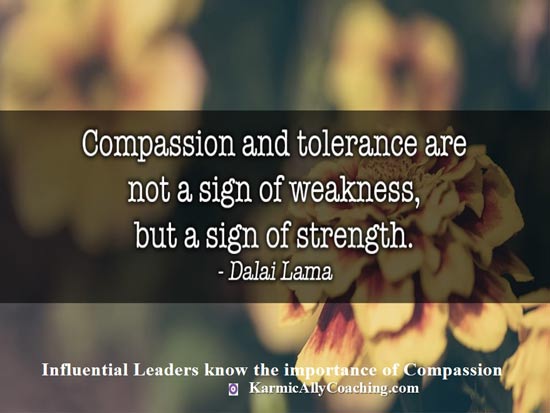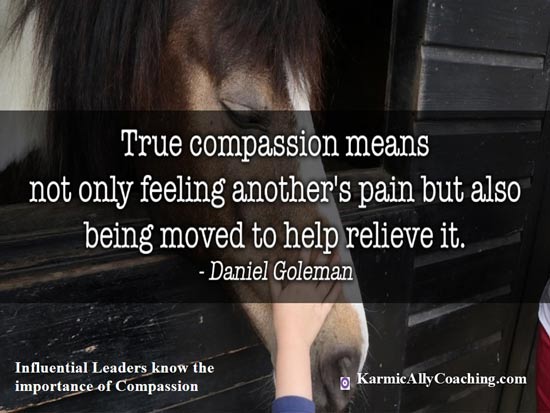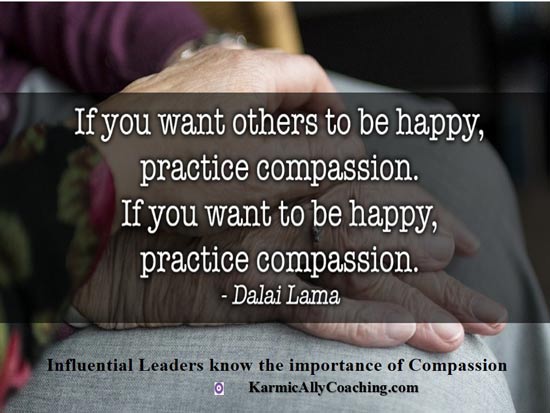This post has already been read 1022 times!

Everyone’s talking about the need to develop Emotional Intelligence if you want your career to go places and even bag a leadership role. But did you know that being a compassionate person helps with demonstrating Emotional Intelligence?
Here’s a question for you.
When thinking of someone who is compassionate, do you associate it with someone who has a martyr/victim personality? Most folks associate compassionate people as soft or weak.
However, compassionate people have an amazing superpower – they know how to use compassion as a strength and not a weakness.
Let’s look at Mother Teresa, who was known for her compassion. Do you see a weak old nun or do you see someone who was a pillar of strength?
That’s what possessing compassion does for us. Had Mother Teresa been in the corporate world, she’d have been seen to possess Executive Presence too.

To make sure we’re both on the same page, let’s look at the definition of compassion.
The Cambridge Dictionary describes compassion as
A strong feeling of sympathy and sadness for other people’s suffering or bad luck and a wish to help them.
I personally prefer the definition from the Merriam-Webster dictionary where compassion is described as a sympathetic consciousness of others’ distress together with a desire to alleviate it.
Either way, compassion involves our feelings and awareness of others and the desire to do something about it.
What is the difference between empathy and compassion?
There’s a difference between empathy and compassion.
Compassion is the broader word: it refers to both an understanding of another’s pain and the desire to somehow mitigate that pain.
Empathy refers to the ability to relate to another person’s pain vicariously, as if one has experienced that pain themselves.
Compassion involves both a feeling and the action that stems from that feeling while Empathy tends to be used for just the feeling.
(Source: Merriam-Webster Dictionary )
Social workers, leaders who take their fellow countrymen to independence possess compassion. The person who sees a stray dog run over by a car and takes the dog to the vet for treatment is definitely a compassionate person.

Compassion in the corporate world
As I mentioned earlier, the skill of Emotional Intelligence is important for a leadership role.
The ability to show empathy for our co-workers and team members plays an important role in being seen as an influential leader.
But there is also a new field of research that suggests promoting an ethic of compassion to help propagate a better workplace environment that in turn would lead to happier employees and better financial results.
This is discussed in the article Why Compassion in Business Makes Sense, which talks about research done by Jonathan Haidt at New York University that showed helping others brings about a heightened state of well-being or ‘elevation’.
Not only does watching a compassionate act make us feel elevation but we’re more than likely to act with compassion ourselves.
When Haidt and his colleagues applied his research to a business setting, hey found that when leaders were fair and self-sacrificing, their employees would experience elevation.
As a consequence, they felt more loyal and committed and were more likely to act in a helpful and friendly way with other employees for no particular reason.
I’ve seen leaders apply compassion when a team member has a sudden bereavement in their family thus encouraging other workers to reach out to help the grief stricken team member.
How many other ways can you think of applying compassion yourself?
The ability of a leader to influence his team in such a manner definitely leads to good team dynamics.
While there are still those leaders who feel showing compassion would make them look weak, I believe there is a strong business case to imbibe compassion in the workplace.
We earn to live and not live to earn. There are times when our personal life simply has to take priority.Like when a child is unwell or a family member is about to have a surgery and we need time off in the middle of a busy business period.
A leader who can show compassion and help the employee and accommodate the crisis will earn the trust, respect and goodwill of the employee which will be returned in full and more once the crisis is over.
Can you learn to be more compassionate?
The answer is yes, adults can learn to be more compassionate.
A new study by researchers at the Center for Investigating Healthy Minds at the Waisman Center of the University of Wisconsin-Madison shows adults can be trained to be more compassionate.
The report, published by Psychological Science, found that training adults in compassion can result in greater altruistic behavior and related changes in neural systems underlying compassion.
(Source: Association for Psychological Science)
In that study, investigators trained young adults to engage in compassion meditation using a traditional Buddhist technique of meditation that includes methods designed to develop loving kindness and compassion for oneself and for others.
3 Powerful Habits that define Compassionate Leaders
A good way to determine if you’re demonstrating compassion is to consider these 3 habits of highly compassionate leaders.
They don’t take things personally
People who emulate compassion both to themselves and for others, have learned the art of not taking things personally. They know when a mistake happens, that is simply a fact – a mistake happened.
They don’t focus on the feeling of failure. Instead, they simply focus on the problem without internalizing it as being about themselves. This allows them to take the next step.
They move forward quickly and rebound
Since compassionate people practice self-compassion as well as compassion for others, they can move forward quickly. They don’t make the problem, mistake, or situation about them.
There is less ruminating, worrying, and talking about problems. There is more of a focus on moving forward and coming up with creative solutions.
They come up with solutions to problems
Rather than ruminating, compassionate people come up with creative solutions to difficult problems.
Compassionate people can feel into what it is like for someone else to experience pain, almost as if they were the ones experiencing it. This offers them an amazing vantage point to problem solving.
This one quality has many benefits:
- In relationships, compassionate people can empathize with others and are better problem solvers.
- In business, compassionate people feel their client’s pain points, communicate with empathy, and help them find creative solutions.
- Socially, compassionate people invite others to be vulnerable due to their trustworthy and empathic qualities.
- Compassionate people have a superpower in being able to listen effectively to what people are saying and even what they are holding back on, as well.
These people have an uncanny sense about other people. This enables them to feel, see, and hear what others are experiencing. Compassion is an attractive quality.
They can draw near to them people who need their gifts, skills, and talents. This gives them an opportunity to not only succeed, but to excel in personal relationships as well as in business settings.

The personality trait of being compassionate is not one of weakness. It is one of personal strength.
Maintaining a balance between compassion and having strong boundaries is a winning combination.
Where in your life can you find ways to be more compassionate to yourself?
Where in your life can you find ways to be more compassionate to others?
When you practice compassion, you’re already ahead of the pack in the race to the top.
You’re showing Emotional Intelligence and can nail this skill even further.
Click here for more guidance on workplace Emotional Intelligence




 I adhere to the Certified Coaches Alliance Code of Ethics and Standards. A copy is available on request.
I adhere to the Certified Coaches Alliance Code of Ethics and Standards. A copy is available on request.
 Let's Talk through the Connect Form:
Let's Talk through the Connect Form: